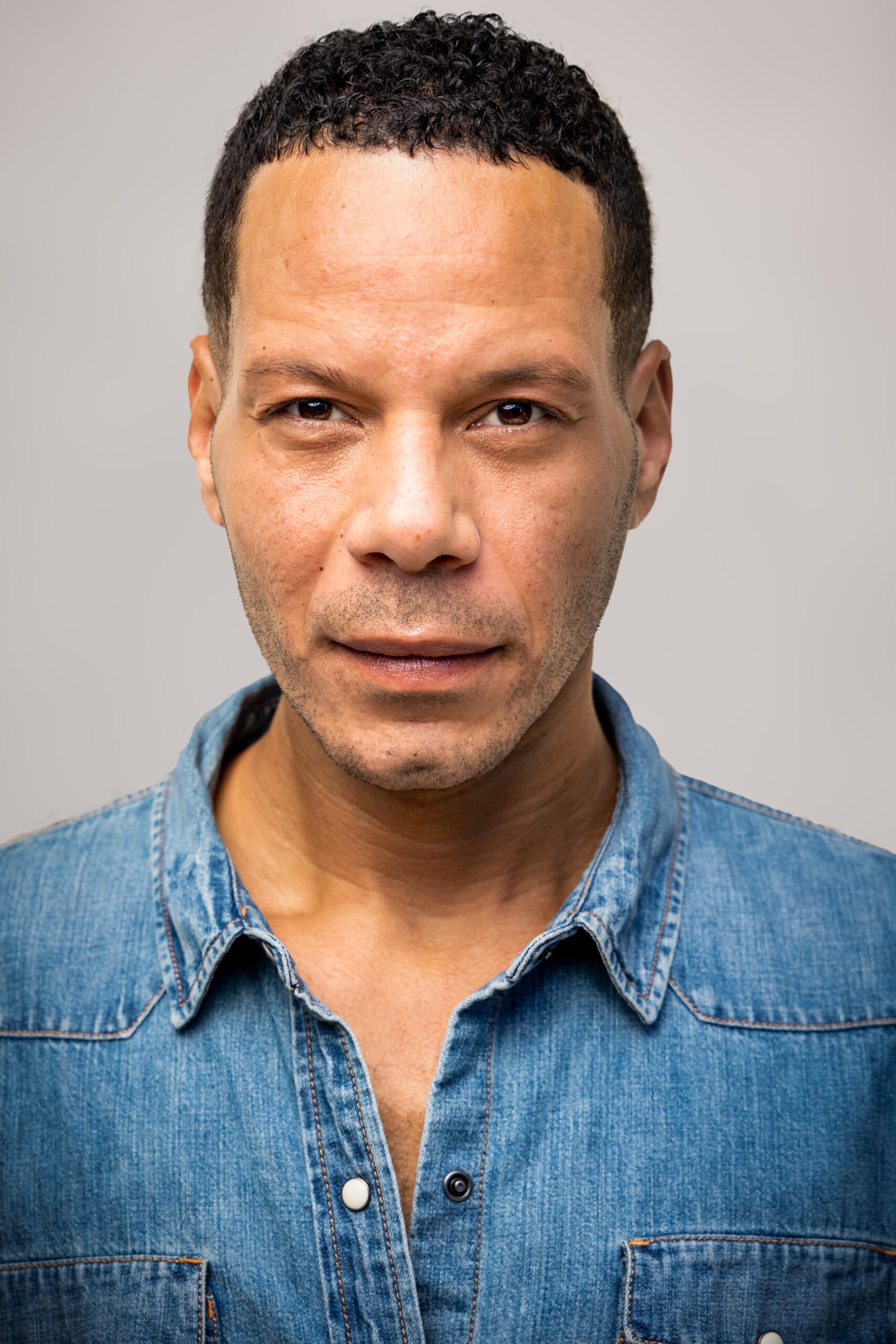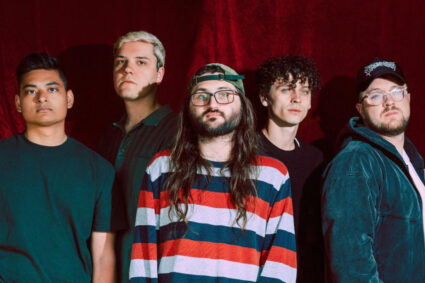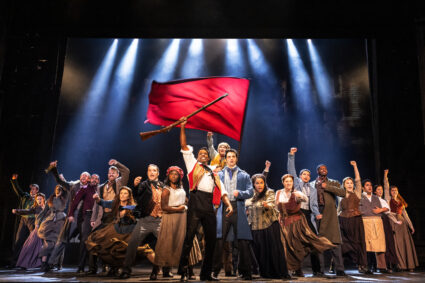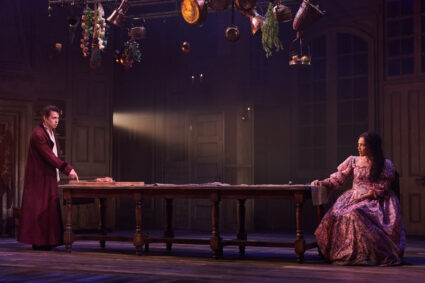
On this edition, Folger Theatre is concluding its 2023/24 season with Mary Zimmerman’s Metamorphoses. The tales of Ovid here are placed in a modern-day setting with an all-Black cast of eleven and directed by Psalmayene 24. Metamorphoses is on stage at the Folger from May 7 through June 16th.
In our first of two-part series of interviews, our guest today is part of this amazing production. You may remember him as Sammy in the HBO series Lovecraft Country. His theatre credits include A Christmas Carol, Who’s Afraid of Virginia Woolf and Angels in America. Let’s welcome to SNAPSHOTS – Jon Hudson Odom.
Thank you so much, Dean, the pleasure being here.
It’s a pleasure to talk with you especially this is your trip back here to DC you’re featured in an all-black cast which is amazing. The first question I want to ask is what can our Washingtonian DC, Maryland and Virginia theater goers look forward to but this production of Metamorphoses?
Well, this particular production of Metamorphoses is going to be the African diaspora version of Metamorphoses. So, it’s an all-black cast. And it is one of the first times I believe that it has been done without a physical pool on stage. We have other representations of water through the physical embodiment, through the actors’ bodies. A sea nymph or water nymph, who will be embodying water. A Plexiglas floor which, at points, will also be a reflection of the water. Fabrics and the different sounds, musical instruments, even jewelry. They’re kind of represent what water may mean to this piece.
I think what they can most look forward to is the universality of the stories being told through black bodies. The inspiration for this piece, through our director, Psalmayene, was through the tragic death of Tyre Nichols in January of ‘23. I think he’d been kind of thinking about what he was wanting to work on. This play came across his desk. And after seeing that on the news had the thought of, they still aren’t seeing us. I think that this production in this particular cast sheds light on exactly that, that by seeing us we will see ourselves.
What is your role in the production?
My role is “Man number two”, which has a couple of different characters. The famous and well-known story of Midas and then the sun god, Apollo and Orpheus, who’s kind of a demigod. But then, we got to music. And then, some random trees and winds and birds and dinosaurs. I think that’s kind of what drew me to the piece in the first place was the ensemble nature. Everyone has their moment to kind of hold the show, but then they also have their moments to uplift the show as well. I think that’s kind of what attracted me to the piece. It’s been a while since I’ve been kind of in a room and had a director say “transform yourself into a bird.”
So, it was nice to kind of have this very childlike playground, that we’re all kind of building this piece on. When you kind of go back to those very childlike instincts, where you truly are just kind of throwing paint against the wall and seeing kind of what the picture is towards the end of the process. I think the fun, which I think even at the beginning of rehearsals, we kind of started going through the dramaturgy of the piece. I had all these questions, of course, why these seven minutes? Why did she put them in this order? Why was this the translation? And our director talked with one of the original cast members, she said, “he may be overthinking it. A lot of it is about the fun of creating storytelling and myths.”
Oh, absolutely. I mean, was it a challenge that you’re portraying a bird instead of a human?
It is. I think, this piece also has a lot of choreography. It was something that kind of scared me, when we show it to the rehearsals. So, its kind of challenged of not only what it is to kind of go back to my dancing, but also what it is to kind of let your body be a vessel for the storytelling. I think that’s where becoming a tree or becoming a bird, really giving yourself over what I was talking about, of this letting go and looking up to the gods to come down and fill you.
Talk about being working under the direction of Psalmayene 24 and is this your first time working under him?
It is my first time working on him. I’ve been a huge fan ever since I saw Word Becomes Flesh. And I think that it’s for those in the DMV area who saw that show, if you can kind of expect that as well, that so much of the storytelling in this piece is punctuated with movement. I think that’s kind of what drew me to solve, as well as the piece that he has a very interesting way of looking at texts and going about text work. And building that ensemble, through a lot of this movement work. And one of the first questions that he asked us on the first day was “what is your relationship to blackness?” And its kind of opened up the rehearsal process in this really beautiful way.
I think that, for me, so much of my career has shaped a lot of my relationship to what blackness is. I think that the amount of care that he’s taking with his piece, and the people in the room are really bring us together as an ensemble, and helping to tell the story of grief can transform us just as much as water or these myths. And what that means for us, as a black community, be transformed by so much of the grief that we’ve experienced over the last 400 years, but specifically, in the most recent years with the Black Lives Matter movement.
I’m glad that Psalmayene actually touch on that. And it’s a great segue to my next question. Why do you feel that we need to continue to promote Black theatre especially within the DMV?
I think truly representation does matter on stage. And even seeing the trend from the year after I graduated, the amount of black bodies that were then in conservatory training or in any training program across the country. Then it started being reflected in our profession as well, but some of the work wasn’t there. The stories weren’t available to us to be told or you were being the token in A Christmas Carol as you brought up earlier. I think by going back to any of the classic Shakespeare or Ovid, we have the chance to create a universality of the human experience that goes beyond race. I think that’s one of the most important reasons of why we need to continue to have black bodies on the stage.
Well, next is a two-part question. You have performed in several theaters within the DC metro area. What is your favorite theater to perform?
Oh, my goodness, how can I answer that question? I think I have to start off by saying Woolly Mammoth, which I’m a committee member and is one of my artistic homes. I’m actually doing an upcoming project there which will be in late August to early fall called The Comeuppance by Branden Jacobs-Jenkins. It’s an incredible piece. The kind of explores death and grief in that piece, as well as the plight of the millennial if you can. I think it was one of the reasons that drew me to DC in the first place is Woolly Mammoth.
Olney Theater Center is another place that I think I got up to seven productions by the time that I had left. So, each of the theaters have a very special place in my heart. I did many workshops and many readings with them. And there were a couple of productions that almost happened but never quite came to fruition. So, this will be my world premiere after at the Folger Theatre which I’m credibly excited about especially after the recent renovations. There’s a great buzz at the theater which I think the DC community does a great job of uplifting all of its artists. So, it’s a wonderful time to be back in DC.
I always like to ask actor this question: What is your dream role – the one that you would love to play one day?
Ooooh, the more difficult questions. I have been blessed with being able to play a lot of my dream roles. One of them was Eugene and Dael Orlandersmith’s Yellowman, which was actually done at Rep Stage several years ago. As well as Belize in Angels in America. I think Hamlet is still. I don’t know how many more years I have to play him but that’s absolutely still one of the one of the dream roles. I think my ultimate dream role I still think is not quite yet been written for me. I think that with every new play that I work on, there’s another aspect of myself as an artist and as a queer artist and as a black artist that I find. I think that those stories are still being written. So, a lot of the times I think I find myself answering the question that I think my dream role is still in my dreams, and it’s still coming to fruition.
I love that answer. I have asked that question so many times in so many years, I’ve never heard anything like normally people have that was answer, but it’s yet to be written. I love that answer. When you’re not performing, what do you like to do in your spare time?
In my spare time, I like to think about all the things that I need to do on the stage. No, in all seriousness, I do think, especially with a lot of the truncated rehearsal process that now happened in the American Theatre, you are fully in it for that short amount of rehearsal, three-week, four-week rehearsal process, that I do find myself kind of meditating on the themes of the play and where I am as an artist. Just the simple joys of being able to go for a run or going for a walk, being back in DC, and coming from Chicago.
Just being outside again, has been just absolutely wonderful to watch the cherry blossoms and this morning, be able to walk around and pop in out of museums with a friend of mine. You know, there’s so much of myself as an artist that it’s hard to turn off sometimes that even in watching a television show. I’m so analyzing it a different way. I think that for me, a lot of my hobbies outside of the theater still do involve the theater in some way. Whether it’s conversations about the theater, working out to get in shape for the theater, doing auditions to get ready to afford to be able to do the theater. I think what I’m learning from this interview is I need more hobbies, Dean.
What’s the best advice you can give for future actors?
I would say educate yourself and whatever way that means for you. If it is going back to school and getting a degree do that. If it means going to see 100 shows do that if it means sitting in your apartment and reading 1000 plays do that. But continue to try to find ways to educate yourself about the industry about the business itself. Always ask questions. I think most importantly; which DC does a wonderful job of is built in artistic community. I think it’s so hard to get lost as an artist and to have a community that grounds you is an incredibly important factor in my career that I really don’t think I’d be at the place that I am without the communities that I’ve been able to build in my career.
Thank you, Jon, so much. You can catch him and the rest of the cast in Metamorphoses on stage at the Folger Theatre starting next Tuesday May 7th through June 16th. For more information on the production, go to https://www.folger.edu/whats-on/metamorphoses/ and please note that Children under the age of 4 are not permitted.
Next up, we will have an interview with fellow Metamorphoses actress Renea Brown
Until we meet again my friends, saying as always – See You… Out There!


